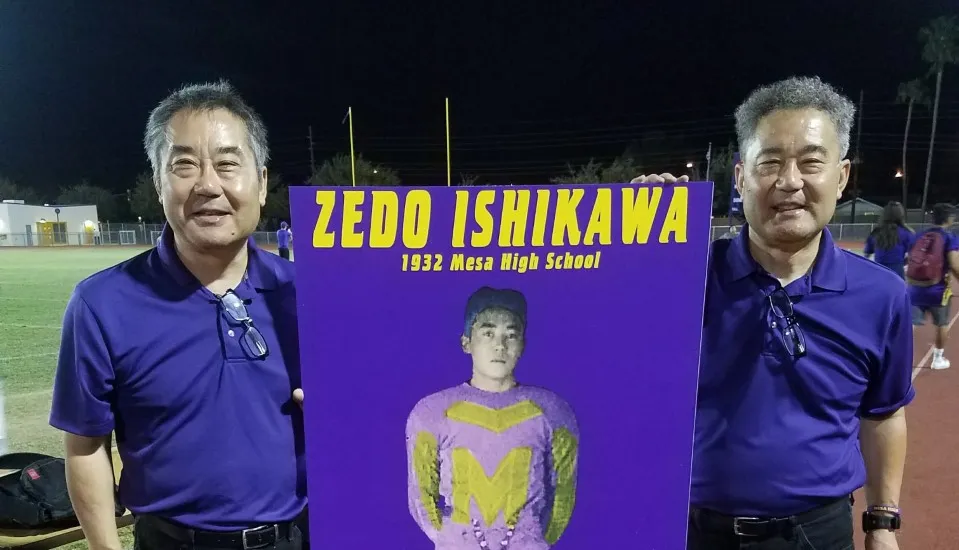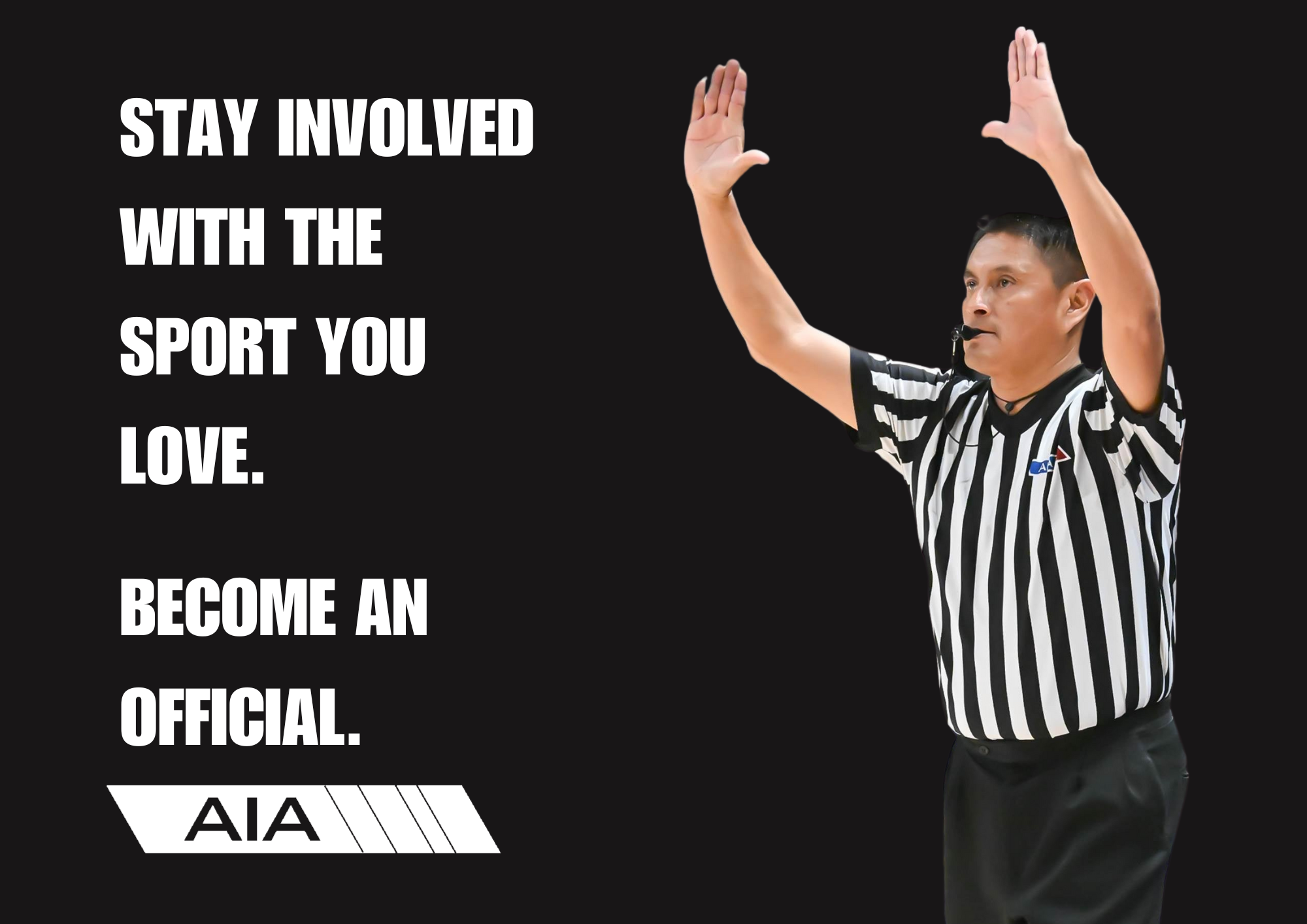Ishikawa's legacy 'carries on' at Mesa
December 9, 2024 by Jack Kartsonis, Arizona State University

Jack Kartsonis is an ASU Cronkite School of Journalism student assigned to cover Mesa High School for AZPreps365.com
It’s almost impossible to walk the grounds of Mesa High School without seeing the slogan. The words plaster the walls, fill the bleachers, and mark almost all memorabilia affiliated with the school.
“Carry On.”
Mesa athletic director David Klecka sits in his office wearing three layers of yellow and purple. Every one of which, without exception, has those words, those ubiquitous words front and center on his clothing. Even his bracelet contains the words. He calls the bracelet his “Zedo Bracelet” in memory of Zedo Ishikawa, the school’s No. 1 symbol, and the origin of the slogan.
The story goes like this — imagine a near-perfect kid, a 17-year-old of incredible importance who’s accomplished everything possible in almost every facet. That’s who Ishikawa was.
“He was an accomplished football player at Mesa High,” Klecka said. “He was a team captain. He was an exceptional student-athlete. He was a natural-born leader; whether he was younger in junior high or in high school, he always rose to the top athletically, academically. Socially, everybody looked to him, whether it be adults or students. He was just one of those special people that everybody gravitated to, and he always did the right thing.”
Then imagine tragedy. On September 22, 1932, the eve of one of the biggest days of his life, Ishikawa died in an accident.
The night before Mesa’s biggest game of the 1932 season, a rivalry matchup against Gilbert High School, Ishikawa went home to rest but was disturbed by a commotion in his backyard. Entering the yard, Ishikawa saw his dog in a fight with another dog. Ishikawa immediately sprang into action. As he attempted to break up the fight, he tried to push his dog free with the butt of a shotgun. The gun accidentally discharged and shot Ishikawa.
“As he laid there, his dad came running out, and he said, ‘Oh, we got to get you to the hospital,’ ” Klecka said. “And Zedo said, ‘I know, but I don't think I'm going to make it. I don't think I'm going to make the game. You need to let the guys know that they need to carry on without me.’ And that's where the ‘carry on’ slogan came from.”
More than 90 years later, nearly 90% of Mesa’s student population knows the story and knows it well, according to Klecka. It doesn’t matter that Ishikawa’s death occurred so long ago. It doesn’t matter that the school has more than 3,000 students. The story is still fresh to the vast majority of Jackrabbits.
The reason for the story’s existing and thriving relevance is Mesa’s strong tradition.
Many attending Mesa now have generations of history at the school. Their parents and grandparents also were Jackrabbits. This generational history has allowed the story to live on.
“The story is wrapped up in the Mesa High tradition, our school colors, our alma mater,” Klecka said. “The Mesa traditions are so solid because grandparents went here, your parents went here. You went here, your kids went here. And so it just stays tight. It doesn't disappear.”
Another big reason for the story’s relevance is that Ishikawa fits the Mesa culture perfectly. Mesa is a hard-working, blue-collar school. Whether students are engaging in academics, sports, clubs, or activities, they’re going to be focused.
“Mesa is very blue collar,” Scott Stansberry, the head coach of Mesa men’s basketball team and a teacher at the school, said. “We want to earn everything. There’s definitely no red carpet around.”
But Ishikawa’s legacy doesn’t just live in collective imagination. It’s grounded in reality. Still, after all this time, Mesa continues to celebrate Ishikawa’s life.
The biggest of those commemorations is the annual cleanup of the City of Mesa Cemetery, which is done in honor of Ishikawa.
“Every August, we meet here on a Saturday at 6 a.m., we load up 15 school buses, and we go to his cemetery,” Klecka said. “We clean the entire cemetery. Everybody gets a bag, and we work our way to his grave in the front.”
In Klecka’s office sits a picture of the event from 2019. So many heads fill the frame that there's almost nothing else in the picture.
Mesa also has “Zedo Games,” for every sport in honor of the school’s hero. Each sport at the school chooses a game, and it’s made a point for all other teams, all school clubs, and all Mesa students to show up.
“As an athletic department, we have implemented what’s called “Zedo Games” where admission for any athlete from any sport is free,” assistant athletic director Kilea Thomas said. “Those games are fun because we bring out food trucks and have games fans participate in throughout all breaks within the football game.”
At the game, there are games, activities, and competitions. Ishikawa is talked about during the game. Announcers will read the contents of his legacy and story. The gatherings are all about Ishikawa.
“Mesa also started doing our special Zedo home games to honor Zedo Ishikawa and promote kids to go to that,” Chelsey Elicio, president of the Mesa football booster club, said. “A lot of times, if you're a student-athlete, they'll let you into those Zedo games. It can come with your coach and with the team and just trying. I think it's helped increase the attendance at all sporting events.”
At the Zedo swim meet this year, coach David Larson declared he had never had such a big crowd before.
Senior wide receiver for the football team, Griffen Yamamoto, seconds the sentiment that Zedo games have contributed to better fan turnout.
“The community and everybody else is showing up,” Yamamoto said. “Earlier in my years, people wouldn't be showing up to games and all that. We're more of a family, and we know each other well now.”
These games aren’t the only time when Ishikawa’s story is relevant to Mesa athletes. Klecka said he personally has seen student athletes talk about and use Ishikawa as motivation when they’re down or in a close game. And after many sporting events, Mesa even sings its school song titled “Carry On.”
“There's a song that we sing, called ‘Carry On,’ after every athletic event, home or away,” Klecka said. “Before the kids get on the bus, we sing ‘Carry On’ with the fans and the teammates. At assemblies, we sing ‘Carry On,’ too.”
Ishikawa’s legacy also plays a huge role in the classrooms. Mesa gives out its own scholarship called the Ishikawa Scholarship. Additionally, Mesa’s main primary school, Zedo Ishikawa Elementary School, was established in 1987 in honor of the exceptional student-athlete.
“His impact on Mesa is second to none,” Klecka said.
What might be most exceptional about Ishikawa’s story is that his family still is involved in the aforementioned events. Two of Ishikawa’s nephews are key participants and leaders of the cemetery cleanup. They attend Zedo Games, and basically any sporting event for that matter.
This is not a one-way street. Mesa loves Ishikawa, and Ishikawa’s family loves Mesa. The reciprocal relationship between the two speaks to the strength of the bond and the power of Ishikawa and his story.
“They [Zedo’s nephews] love it all,” Klecka said. “They love being able to talk about Zedo. They come to every football game. They come to basketball games. If you’re at Mesa, you'll see them and you probably already have seen them. They're at everything.”
What lives on most about Ishikawa are the values he instilled in the Mesa community and at Mesa High School. His selflessness in thinking of others before himself, and his attitude toward an ethic of hard work still represents everything the school stands for.
Ninety-two years later, Ishikawa’s message still resonates.
“Zedo and the ‘carry on’ shows you that Mesa High is bigger than anybody, and that when you're having a hard time, you think about your environment, you think about this school, and you think about basically what he went through,” Klecka said. “At that moment of where he was in his life, as he’s at the end of the road, he thought about his teammates and Mesa High, and he wanted to let them know to carry on and move forward.”
“No matter how hard we have it, you've got to carry on,” Klecka said. “You got to move forward.”



